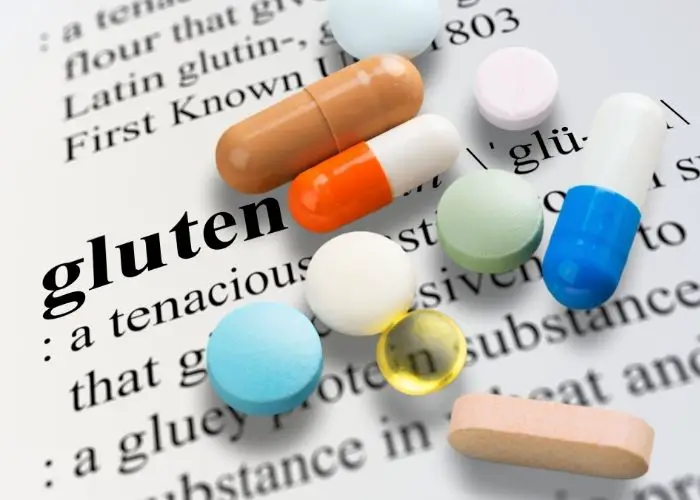Last Updated on January 11, 2022
Today, we’re going to be answering the question: is amoxicillin gluten-free? And looking at whether medications contain gluten and which medications are gluten-free. When you first receive your diagnosis, you’ll definitely be mindful of the foods and drinks you eat – but something you may not be thinking about medication. Some medications can contain gluten. So which are gluten-free? Is amoxicillin gluten-free? Let’s take a closer look.
What Is Amoxicillin?
Amoxicillin is one of the most common penicillin antibiotics. It’s used to treat a number of bacterial infections, including strep throat, pneumonia, and ear/skin infections. It is usually taken orally in pill or liquid form. It can cause a range of side effects, which we’ll be taking a look at later.
Is Amoxicillin Gluten-Free?
Amoxicillin does not usually contain any gluten ingredients. In fact, most medications do not contain any gluten and are considered gluten-free. However, there are a few brands of amoxicillin that carry a gluten-free label. These brands are Apothecon, Novapharm, and Teva. If you are particularly sensitive or have celiac disease, it may be best to request those brands from your GP.
However, the vast majority of prescription medications do not contain gluten. If you’re unsure about any medication, consult your GP and discuss any concerns you may have.
Are Antibiotics Gluten-Free?
As we’ve seen, most antibiotics do not contain gluten and are considered gluten-free. There are a very small number of medications that contain wheat starch. Although the usage will be very low, it is quite a common ingredient in several medications. However, if you discuss your concerns, there are gluten-free substitutes for almost every medication.
It’s important never just to assume that medication is gluten-free. There will always be an information leaflet that comes with any medication you are prescribed. Be sure to check this. Frustratingly, pharmacies are under no legal obligation to disclose whether their medication is gluten-free or not.
Even more frustratingly, the side effects you receive from medicines like antibiotics can be very similar to when eating gluten. If you experience any side effects that are a cause for concern, be sure to consult your GP.
Why Would There Be Gluten In Medication?
You may find gluten in medication because just like with foods, gluten is a great binder. They hold medication together well; this is especially the case for tablets. Liquid medicine will almost never contain gluten. Over the years, fewer tablets contain gluten – but it’s always best to check with your GP if you’re feeling anxious about taking a new medication.
Warning Signs
We know wheat starch is a commonly listed ingredient, but that’s an obvious one to avoid. Some other ingredients to watch out for are:
- Modified starch
- Pregelatinized starch
- Pregelatinized modified starch
- Dextrates
- Dextrin
- Dextrimaltose
- Caramel coloring
As pharmaceutical companies do not need to disclose the source of the ingredient, it’s difficult to know whether the medication is gluten-free. But don’t worry, we’ll be looking at an extensive list later in this article. If the source of the ingredients is stated, lookout for signs of wheat, barley, rye, and oats.

Gluten-Free Drug List
You may be looking for a list of gluten-free medications, and Celiac-Disease have an incredible, extensive one. Some of the most common medications that are gluten-free and safe for consumption are:
- Accolate
- Advil
- Alka Seltzer
- Amoxicillin
- Ativan
- Basic Vitamins
- Benadryl
- Cefadroxil
- Clomipramate
- Clorazepate
- Cortisone
- Effexor
- Fluoxetine (ONLY Barr and Par varieties are gluten-free)
- Folic Acid
- Gaviscon
- Hydrocortisone
- Ibuprofen
- Imodium
- Lactacid
- Lexapro
- Lorazepam
- Naproxen
- Pepto Bismol
- Procaine
- Prozac
- Ramipril
- Ranitidine (Geneva, Novapharm)
- Sudafed
- Tylenol
- Vascor
- Ventolin
- Viagra
- Warfarin (Barr)
- Zoloft
Find more information Are Amino Acids Gluten Free?
This is just a small selection of common medications I’ve chosen from the list; it’s by no means extensive. Check out the article for the full range. It’s important to note that new medications are continuously being released, so the list may not be entirely up to date with every medication and its ingredients. Your GP will be more than happy to help with any queries you have regarding the new medication.
It’s also important to note that if you experience side effects that are listed on the leaflet, please do not stop taking any prescribed medications before consulting your doctor – that is dangerous and not advisable.
Over The Counter Medications
With over-the-counter medications, it may seem a little more daunting. The pharmacist may be able to assist, but it’s unlikely they will know the ingredients and gluten-free status of every over-the-counter medication. On the packaging, there is usually a phone number or email to contact the manufacturer. If you do not want to start taking the medication before receiving an answer, that’s completely understandable. Alternatively, try to find another solution in the meantime.
Conclusion
I hope this article has helped to answer the question: is amoxicillin gluten-free? And helped to familiarize you with some of the gluten-free medications that are deemed as safe for gluten-free consumption. It’s not always an easy process, particularly if you’re collecting medication on behalf of someone else who is gluten intolerant or celiac.
It’s worth mentioning that the most common side effects of taking antibiotics such as amoxicillin are:
- feeling sick (nausea)
- Diarrhea
- abdominal pain
As you can see, they’re very similar to consuming gluten when you’re gluten intolerant, so it’s best not to make assumptions that it’s the tablets causing a reaction. I can not stress enough that if you have any concerns or worries, please consult your GP, as they know you best.
Are there any medications that surprised you when you learned they contained gluten? I’ll be honest, any medication that contains gluten surprises me! Surely getting better shouldn’t make us feel worse with what we’re taking?! Please feel free to leave any experiences in the comments below.

Hi, my name’s Zoë. I’m 28 years old and live in London, UK. I work full time as a freelance writer and critic for West End theatre. Writing has been a passion of mine for as long as I can remember. I spend most of my free time at the theatre, or at conventions. I’m married to the love of my life, and live in a small apartment with my fur baby, Lillie. I run two of my own blogs: No Safer Place and Stage to Page: both of which have won awards. I also have a YouTube channel where I talk about all things stagey.
